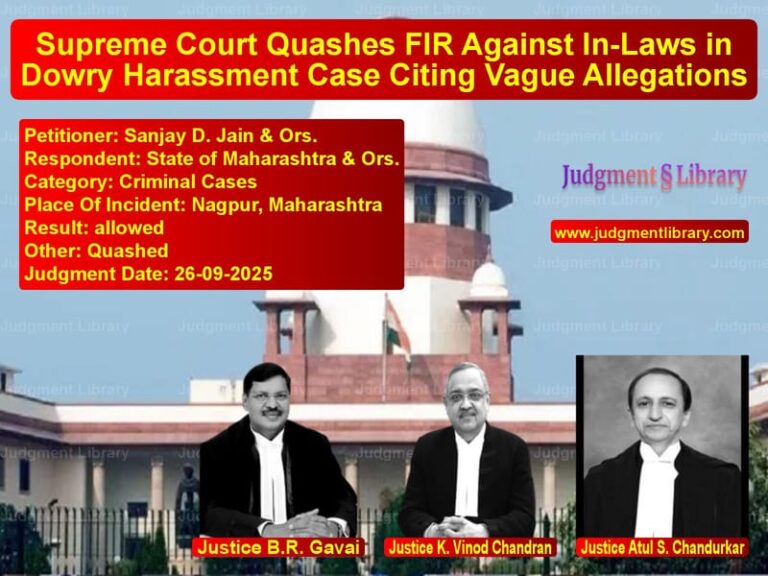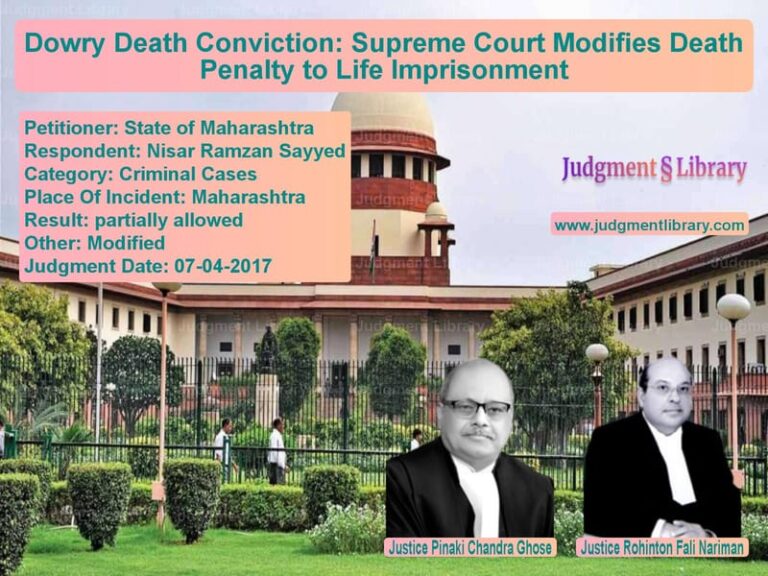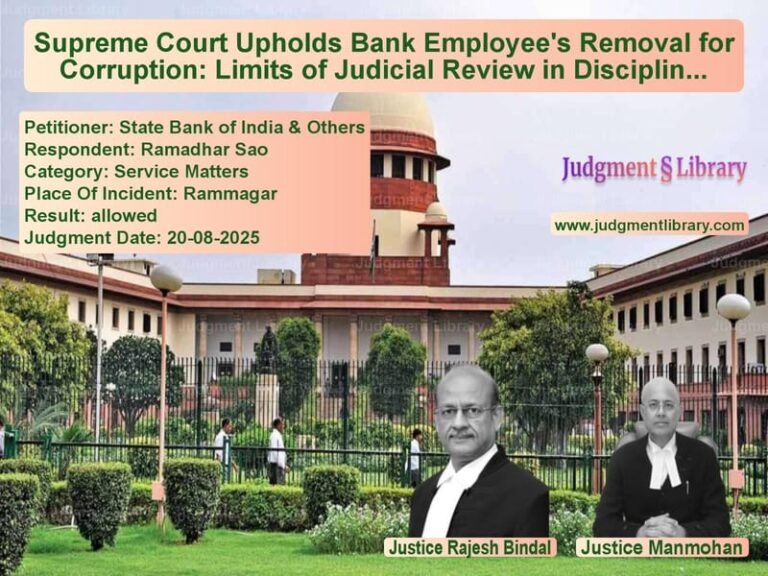Supreme Court Restores Auction Sale of Temple Land After 23 Years
The case of K. Kumara Gupta vs. Sri Markendaya and Sri Omkareswara Swamy Temple & Others is a significant ruling regarding auction sales of endowment properties. The Supreme Court had to decide whether an auction sale conducted in 1998 should be set aside after 23 years due to subsequent challenges and claims that the land value had increased.
The ruling protects the sanctity of public auctions while ensuring that religious institutions receive fair consideration for their assets.
Background of the Case
The case revolves around the sale of 1.81 acres of temple land belonging to the Sri Markendaya and Sri Omkareswara Swamy Temple, Eluru, Andhra Pradesh. The temple authorities had decided to auction the land and published a notification in the Andhra Pradesh Gazette on May 22, 1997. The expected price was set at ₹4,00,000 per acre.
Following the due process, an open auction was held on June 24, 1998, in which 45 participants submitted bids. K. Kumara Gupta, the appellant, emerged as the highest bidder with an offer of ₹13,01,000 per acre, well above the expected price. He deposited one-third of the amount immediately and later paid the full bid amount.
The auction was confirmed, and the sale deed was executed in his favor on December 31, 1998. However, a long series of litigations followed, delaying the final transfer of the property.
Legal Issues Before the Supreme Court
- Was the auction sale conducted in 1998 valid, or should it be canceled after 23 years?
- Did third-party claims of higher offers justify a re-auction?
- Did the temple authorities act in good faith while conducting the auction?
- Should an auction winner suffer due to prolonged litigation and changes in land valuation?
Arguments Before the Supreme Court
Appellant’s Arguments (K. Kumara Gupta)
The appellant, represented by his counsel, contended:
- The auction was conducted fairly, with 45 bidders participating, and he was the highest bidder.
- He had fulfilled all contractual obligations by paying the full bid amount and obtaining a sale deed.
- Third parties who later claimed they were willing to pay more had never participated in the auction.
- The long delay in completing the transaction was due to unwarranted litigations, and canceling the sale after 23 years would be unfair.
- The temple had already benefited from the sale proceeds, and the challenge was being pursued by private interests rather than the temple itself.
Respondent’s Arguments (Temple & Others)
The temple authorities and interveners countered:
- The land value had significantly increased since 1998, and the temple stood to benefit from a re-auction.
- A third party, Jagat Kumar, had offered ₹22,00,000 per acre after the auction, and another party, L. Kantha Rao, had furnished a bank guarantee for ₹30,00,000.
- The Endowments Department and state authorities had the responsibility to maximize revenue for the temple.
- The sale should be set aside, and a fresh auction should be conducted at current market rates.
Supreme Court’s Judgment
The Supreme Court ruled in favor of the appellant, restoring the sale and quashing the order for a re-auction. The key findings were:
- The auction had been conducted properly in 1998, and the highest bidder had lawfully acquired the land.
- Claims of higher offers made after the auction had no merit, as those individuals had not participated in the bidding process.
- Setting aside a public auction after 23 years would undermine confidence in government auctions.
- Courts should not interfere in auction sales unless there is proven fraud or illegality, which was not the case here.
The Supreme Court observed:
“The sanctity of public auctions must be maintained. If auctions are set aside due to subsequent claims of higher prices, it would deter genuine bidders from participating in the future.”
Key Observations from the Judgment
- Sanctity of Public Auctions: Auctions must be final unless there is proven fraud or illegality.
- Fair Market Price: The highest bid received in a competitive auction is the fair market price.
- Third-Party Claims: Individuals who did not participate in an auction cannot later claim they were willing to pay more.
- Delay in Litigation: Prolonged legal battles should not invalidate legitimate transactions.
Impact of the Judgment
This ruling has significant implications for property transactions and auction sales:
- For Auction Participants: Provides assurance that auction sales will be upheld if conducted fairly.
- For Religious Institutions: Clarifies that temples and endowments must conduct auctions transparently and cannot cancel sales arbitrarily.
- For Legal Precedents: Strengthens the principle that courts should not interfere in legitimate auction processes without strong reasons.
- For Future Auctions: Encourages transparency and prevents interference from non-participants.
Conclusion
The Supreme Court’s ruling in K. Kumara Gupta vs. Sri Markendaya and Sri Omkareswara Swamy Temple & Others reinforces the importance of upholding public auction sales. By restoring the sale after 23 years, the Court has sent a strong message that auctions must be respected, and subsequent claims of higher prices cannot be used to invalidate legitimate transactions.
This decision ensures that auction sales remain reliable and that bidders can participate with confidence, knowing that their purchases will not be unfairly challenged decades later.
Petitioner Name: K. Kumara Gupta.Respondent Name: Sri Markendaya and Sri Omkareswara Swamy Temple & Others.Judgment By: Justice M.R. Shah, Justice B.V. Nagarathna.Place Of Incident: Eluru, Andhra Pradesh.Judgment Date: 18-02-2022.
Don’t miss out on the full details! Download the complete judgment in PDF format below and gain valuable insights instantly!
Download Judgment: k.-kumara-gupta-vs-sri-markendaya-and-s-supreme-court-of-india-judgment-dated-18-02-2022.pdf
Directly Download Judgment: Directly download this Judgment
See all petitions in Property Disputes
See all petitions in Contract Disputes
See all petitions in Judgment by Mukeshkumar Rasikbhai Shah
See all petitions in Judgment by B.V. Nagarathna
See all petitions in allowed
See all petitions in Quashed
See all petitions in supreme court of India judgments February 2022
See all petitions in 2022 judgments
See all posts in Civil Cases Category
See all allowed petitions in Civil Cases Category
See all Dismissed petitions in Civil Cases Category
See all partially allowed petitions in Civil Cases Category







